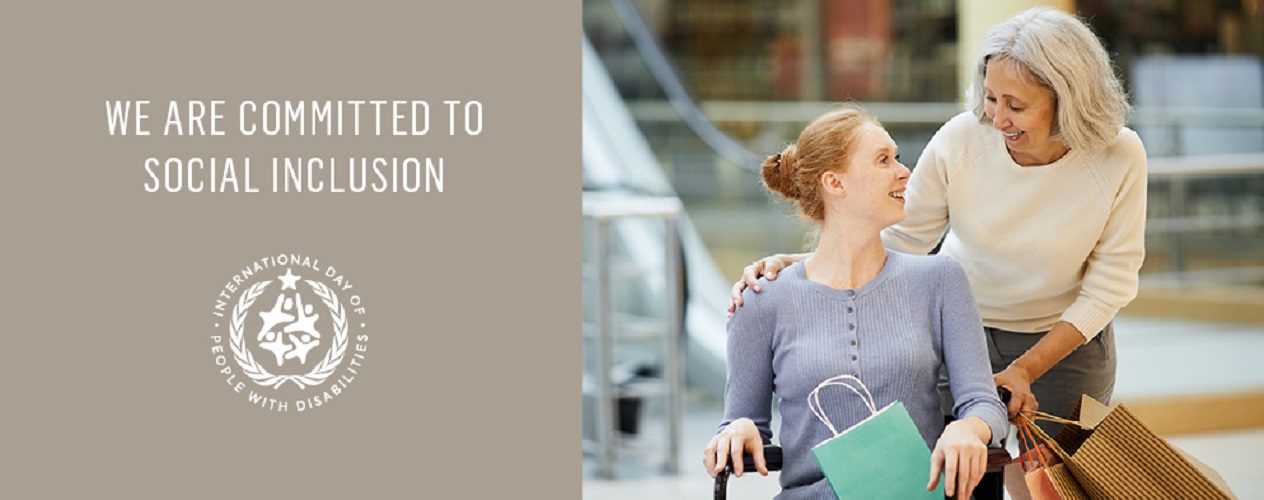Promoting disability inclusion across our destinations
The annual observance of the International Day of People with Disabilities on December 3rd is a time to celebrate the changes we are implementing in our destinations to enhance the customer experience for disabled persons, not just today, but all year round.
The global crisis of COVID-19 is deepening pre-existing inequalities, exposing the extent of exclusion and highlighting that work on disability inclusion is imperative. People with disabilities—one billion people— are one of the most excluded groups in our society and are among the hardest hit in this crisis in terms of fatalities.
Today more than ever, we are committed to ensuring that persons with disabilities feel welcome and at ease in our destinations, by offering tailored services and facilities adapted to their needs. This encompasses a number of locally tailored actions: from accessibility audits with local associations to the appropriate actions to make our destinations more inclusive, such as the introduction of tactile and Braille signage for visually impaired visitors.
In 2020, we launched a dedicated training course across Europe to raise awareness on the topic of social inclusion. Created together with the French association ADAPEI, the learning programme is provided to every employee working in direct contact with visitors, with a mix of theory and practice (sample case scenarios). The aim is to help our staff better understand the diverse nature of disability (including hidden or invisible impairments), identify situations where specific assistance might be needed, devise suitable responses and adopt appropriate behaviours.
In line with our Better Places 2030 strategy, we have taken a series of measures towards inclusion across our regions:
Our commitment to promote accessibility and support the inclusion of the disabled in our shopping centres illustrate our determination to make positive contributions to the well-being of our communities. We see ourselves as leaders of change, using our assets and collective strength to raise awareness, mobilise and provide spaces where people feel they belong.
The global crisis of COVID-19 is deepening pre-existing inequalities, exposing the extent of exclusion and highlighting that work on disability inclusion is imperative. People with disabilities—one billion people— are one of the most excluded groups in our society and are among the hardest hit in this crisis in terms of fatalities.
Today more than ever, we are committed to ensuring that persons with disabilities feel welcome and at ease in our destinations, by offering tailored services and facilities adapted to their needs. This encompasses a number of locally tailored actions: from accessibility audits with local associations to the appropriate actions to make our destinations more inclusive, such as the introduction of tactile and Braille signage for visually impaired visitors.
In 2020, we launched a dedicated training course across Europe to raise awareness on the topic of social inclusion. Created together with the French association ADAPEI, the learning programme is provided to every employee working in direct contact with visitors, with a mix of theory and practice (sample case scenarios). The aim is to help our staff better understand the diverse nature of disability (including hidden or invisible impairments), identify situations where specific assistance might be needed, devise suitable responses and adopt appropriate behaviours.
In line with our Better Places 2030 strategy, we have taken a series of measures towards inclusion across our regions:
- In pursuit of our commitment towards social inclusion, Westfield London is working hand in hand with a dedicated Access Group, including local NGOs and involved residents. The centre is adopting the Hidden Disabilities Sunflower campaign that discreetly indicates to employees that customers need additional support, help or a little more time. All our staff, service providers and retailers will work together to ensure that visitors wearing the sunflower have the best experience, knowing they are taken care of.
- In the Paris region, Westfield Vélizy 2 has been working with local NGOs to improve accessibility in the centre and develop dedicated services for people with disabilities. This partnership led to the creation of a social inclusion committee, the installation of electric scooters for people with reduced mobility, and the launch of a partnership with a local social health-care institution to advance the employability of disabled people. The centre will also test a new service to evaluate its relevancy: one employee dedicated to welcome and accompany a disabled customer in the centre based on previous appointment.
- In the United States, various initiatives have also been launched this year, including dedicated e-training courses and awareness-raising workshops, along with efforts to enhance the overall guest experience for persons with disabilities.
Our commitment to promote accessibility and support the inclusion of the disabled in our shopping centres illustrate our determination to make positive contributions to the well-being of our communities. We see ourselves as leaders of change, using our assets and collective strength to raise awareness, mobilise and provide spaces where people feel they belong.




